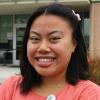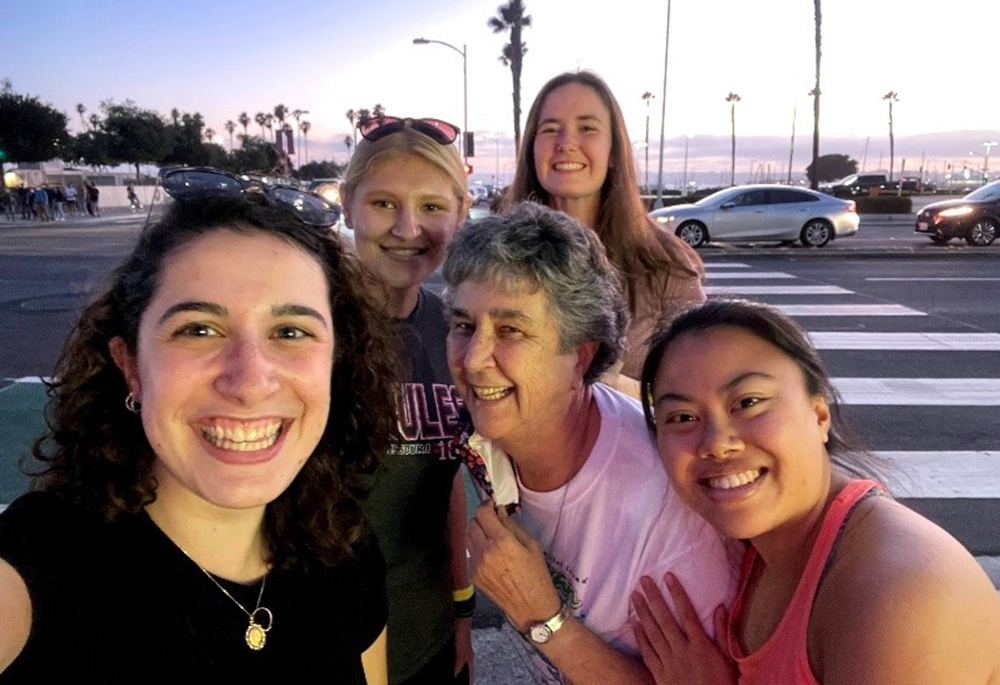
From left: Nina Dorsett, Emily Michaelis, Sr. Louise Ann Micek, Emma Shay, and I are pictured in a selfie. We ate at a restaurant in downtown San Diego after our service with migrants to reflect about our experiences. (Courtesy of the Sisters of St. Joseph of Orange)
I recently ended my year of service. Therefore, it is bittersweet to announce that this will be my final blog post. However, with that, I wanted to dedicate this piece to the fundamental life lesson I will carry with me from my year of service. I'd like to talk about women.
My entire life, I've always been told what I could not do. And, I mean, it's obvious why: I'm a Filipino woman with depression. Whether it was me talking to myself or society telling me (not so subtly), there were constant barriers to doing the things I dreamed of.
When I was in college, certain family members would berate me for hanging out with friends in the evenings, sleeping over, or dating. I thought it had something to do with me being a young adult, but then I asked why my brother could do all of those things, and I was told that he is a man and I am a woman.
I remember getting my hair cut one day, and my hairstylist noticed I wasn't wearing any makeup. She told me that a 16-year-old girl should wear makeup. I responded that I didn't really know how to use it. She was shocked and started prescribing YouTube videos to watch and Instagram accounts to follow for me to learn.
Once, I had a teacher look at me and said, "You've grown to be such a smart and independent personality for a Filipino girl."
I was told I shouldn't wear pants. I was ridiculed for having a "boy's name." I was told my only job in life is to attract a financially stable man and have a family.
And all of this just because ... I am a woman.
I had my doubts about where I should go, how I should live, and what dreams I would make come true. That is, until my entire world changed when I met immensely strong women within my year of service.
Now, it's crazy to assume, but I'm sure women reading this will relate with these experiences because these experiences aren't just my own. Women experience unjust inequalities compared to men all around the world and all throughout history. Whether it's unfair dress codes, lack of educational opportunities, gender-based violence, unfair wages, dating struggles, or unequal voting rights, women seem to be second-class citizens or accessories to men.
Throughout all parts of the world, there seems to be this rule: Women will never be as successful as men.
Because of that, of course, I had my doubts about where I should go, how I should live, and what dreams I would make come true. That is, until my entire world changed when I met immensely strong women within my year of service.
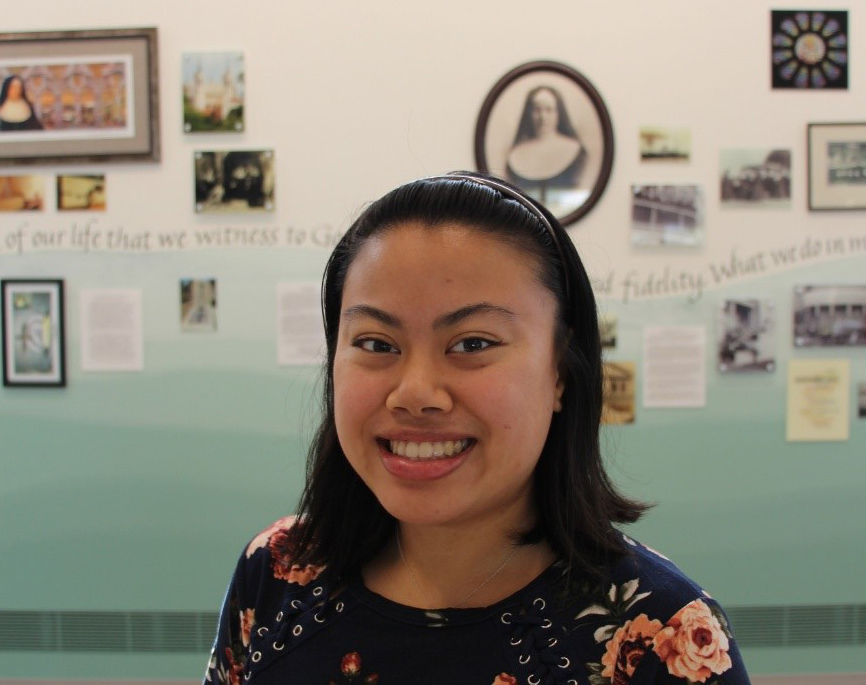
Me in the Heritage Room with the inspiring history of the Sisters of St. Joseph of Orange, California, behind me (Courtesy of the Sisters of St. Joseph of Orange)
I joined the St. Joseph Worker Program of Orange, California, a program that is unique in many ways, but most importantly in the fostering of womanhood. It's an all-girls program that lives the mission of the Sisters of St. Joseph, so there is a huge influence of service-oriented, justice-driven, and religious women.
I found my worth in my spirituality from the Camino retreat with Sr. Mary Beth Ingham. I found my love of community and helping refugees from the San Diego trip with Sr. Louise Ann Micek. I was inspired by the history of the sisters in the Heritage Room with Sr. Patricia Haley. I prayed around the motherhouse campus to celebrate the Year of St. Joseph with Sr. Kit Gray. It was a glorious time of female solidarity and learning about my spirituality within service.
But my experience did not end there. As I began to serve at Mission Hospital, I found yet another community of strong female leaders in public health, most of whom are women of color.
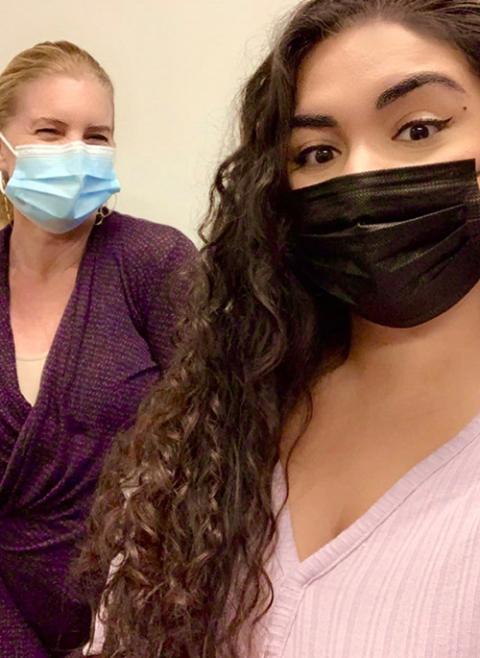
Christy Cornwall, left, and Michelle Aslami, both of whom work at Mission Hospital, wore purple in October 2021 as part of Mission Hospital's commemoration of Domestic Violence Awareness Month. (Courtesy of Mission Hospital)
Christy Cornwall has been the director of community benefit at Mission Hospital for 20 years, managing dozens of projects, such as mental health campaigns and expanding clinical services to people experiencing homelessness.
Johanna Figueroa and Marcela Quinonez manage the South Orange County Family Resource Center by providing hundreds of different services to clients in need — and they really do know hundreds of different services.
Rocio Telumbre, Jenny Sanchez and Gabriela Balderrama Zazueta are community health advocates who promote free COVID-19 clinics, emergency relief funding for families, and food for low-income households.
Maria Peralta-Sanchez and Jennifer Romo are community care navigators who take thousands of homeless individuals and provide them with medical care, housing, and financial stability. They truly take anyone and everyone who is in need.
Marci Mednick works with dozens of schools in Orange County to educate against and prevent youth substance abuse, including managing school clubs and working with law enforcement, physicians and government officials.
Irma Garcia is a therapist and social worker who manages the graduate school interns as they provide short-term therapy sessions for all types of people.
Diana Linn manages community behavioral health within the department, including psychiatric services, mental health campaigns, psychological and wellness trainings, and meditations for the staff.
Oh, and just when you think these women weren't working hard enough, they do all this work in both English and Spanish.
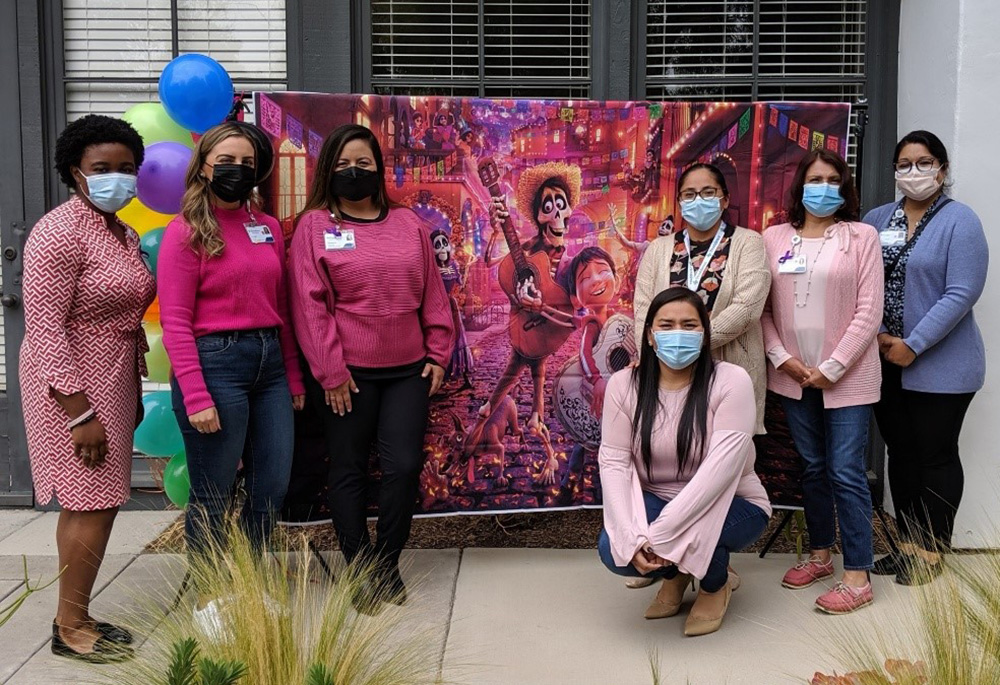
From left: Cindy Emenalo, Teresa Jones, Rebecca Cervantes, Nadia Moreno, Maria Peralta-Sanchez, Jenny Sanchez, and Jennifer Romo, all of whom work at Mission Hospital, wear pink in October 2021 to commemorate Breast Cancer Awareness Month. (Courtesy of Mission Hospital)
These women are incredible, and I woke up every morning excited to go to work with them. Not only was I confident as a woman of color, but I was also motivated to serve the community with passion, just as they did.
Then I would come home from work to a community of young women who, just like me, dedicated their lives to service this year. Emily Michaelis serves the elderly Sisters of St. Joseph of Orange within Regina Residence. Emma Shay teaches writing to elementary school students of St. Joseph Catholic School. Nina Dorsett is a campus minister for high school girls at Rosary Academy. Honorine Uwimana is working toward her master's degree in public health and previously served Regina Residence. Cindy Emenalo works at Mission Hospital, specifically for the Community Health Enrichment Collaborative Family Resource Center.
Along with these women, the St. Joseph Worker Program leadership team of Sr. Joanna Rosciszewska, Mary Vagnone, Yesica Villalobos, and Christina Cardona as well as the support of Natalia Shilaimon, who photographed our service year; Maria Elena Perales, who manages the social justice office; and Jaclyn Guerrero, who provides spiritual direction, provided immense support within our program.
Advertisement
And, of course, to top it all off, writing for Global Sisters Report with Caileigh Pattisall, Julia Gerwe, Mary Lou Nolan, Pam Hackenmiller and Gail DeGeorge opened countless experiences of women's empowerment from long-term friendships, collaborating on service projects, and supporting each other's writing.
These women in my year of service changed my life; my entire perspective shifted from a man's world to a woman's world. Women all around me were changing the game, responding to God's call as sisters, serving those in need at Mission Hospital, choosing to do a year of service after college, or writing on a national level. These women were limitless. And so I, too, was limitless.
People used to tell me discouraging stories of being a woman, reminding me of what I could not do, what I should wear, how I should act. But in my service year, all of that changed. I was praying, serving and advocating with all of these women as they inspired me to aim high, dream big and work hard. Opportunities and experiences I never thought I would achieve were right here, waiting for me, and all I had to do was work at it. It was a woman's world. It is a woman's world.
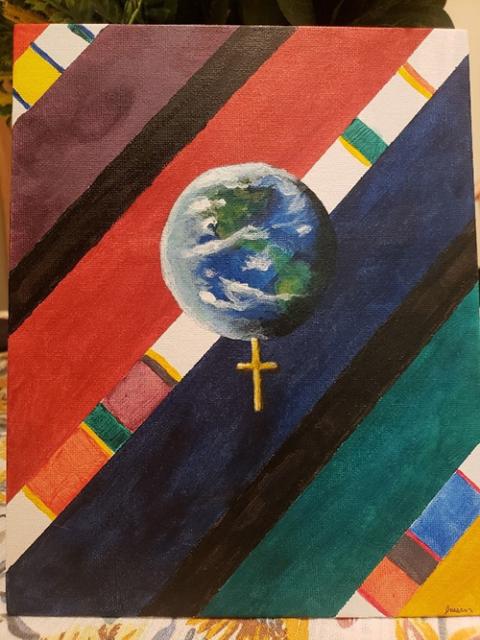
A painting I made called "Womankind," a piece that is unfinished to symbolize other women finishing this vision (Jaesen Evangelista)
Women in my service year told me:
"A man said to me that I, a woman, could never truly follow God's work. ... I became a sister and proved him wrong."
"You don't understand how comforting and empowering it is as a female client to be served by such wonderful women here at the Family Resource Center."
"It's intimidating being a woman in a working world with men all around you and with children at home, but that's why women are as strong as they are. We overcome challenges men will never understand, and we have an unparalleled emotional connection with humanity."
"Our foundress, Mother Bernard Gosselin, wasn't a woman who waited for things to happen. She went straight to the banks many years ago and convinced them with only her spirit to give her property loans for our motherhouse."
"Though I've never had any biological children of my own, hundreds of children whom I have served as a sister always considered me their mother."
"Jaesen, you're a woman. That alone is enough to shake the entire world."
Now, I don't expect my blog post to change the world. I don't even expect much of a response. But to any woman reading this, to every woman reading this, allow my service year to speak these crucial words: Be a woman and be limitless.
Dream big and own the world. In our Catholic faith or perhaps on a more secular global scale, we need women. We need you.
As I end my service year and as I write my last words to you, let this not only be a promotion for a year of service or even a way to advocate for equal rights. Let this be a call to be a woman and see the limitless possibilities this world can offer you.
